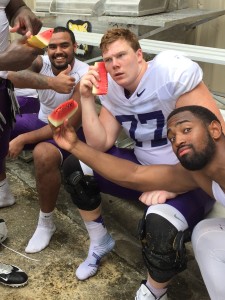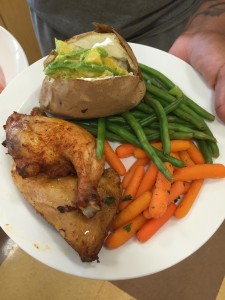
What do LSU football players eat before a game?
Nutrition director Lauren Reagan talks pre-game meals for LSU football players

Before the first kickoff, one of the most crucial components of LSU’s game plan is the food that fuels the players. Director of sports nutrition Lauren Reagan is the woman choosing what our boys eat in the hours before the game begins with the help of Unique Cuisine catering. With a background at Texas Tech and Notre Dame, she knows what athletes need to power up.
225 caught up with Reagan ahead of this weekend’s Arkansas matchup to talk about what stars like Leonard Fournette and Brandon Harris eat to stay in shape and push through each game.
How many pre-game meals do you plan for the players?
About 24 hours before the game, we’re at the [Cook Hotel & Conference Center]. We’ve got a Friday dinner, a snack after that before we go to bed, an early breakfast for guys who get up a little sooner, a more substantial breakfast and a pre-game meal. It all depends on the timing of the game. There’s quite a bit of feeding that goes into the hours before the game.
|
|

About how many calories does an LSU football player consume per day?
It varies with the player’s position and day. If it’s August, the calories will be a lot higher. During the season, it’ll still be high, but if there’s not practice that day, it changes. On average, you may see one guy eating 3,500 calories, and the same day there’s a different [player] eating 6,000 to 7,000 calories depending on if he needs to maintain or gain weight.
What are the components of a strong pre-game meal?
For a pre-game meal, we have to be pretty conscious of what nutrients we’re giving. We don’t want to give them anything they’re going to be feeling on their stomach while they’re playing. If you give a high-fat meal or something high in fiber, they may start feeling that.
We focus on lean proteins like grilled chicken or lean red meat and energy-sustaining carbs that aren’t as high in sugar—whole grains—four hours out, to stick with them longer and give them energy. We’ll do non-cruciferous vegetables. Broccoli, cauliflower and spinach cause more action in the stomach, so we stick to veggies that are digested quicker—green beans and carrots. We’ll have pasta; there’s always going to be spaghetti there. We don’t like to have a lot of spices to those meals, because we don’t want any indigestion.
What foods are best for powering up players?
People may be surprised to hear this, but it’s going to be something with sugar. Sugar digests a lot quicker, so our athletes are going to feel it immediately. Energy bars or quick snacks, some fruit, even a little PB&J is fine. One of the favorite halftime snacks is a Rice Krispie Treat. They don’t have to think about it or force it down; it tastes good and gives them quick energy.

Outside of that, the best things whenever they’re not competing in that moment but to build their energy and keep their bodies efficient are lean proteins. Chicken, any type of white meat, lean red meats. Something a little higher in iron is great for these guys as well. I also love to give them salmon, and they love salmon. It’s got healthy fats for them that help them recover their bodies, fill them up and help with any soreness. For energy, carbs—any kind of brown rice or pasta, not a heavy mashed potato.
How much of the players’ diets do you control outside of pre-game meals?
These guys are dedicated and motivated. They have control over what they eat, so if they don’t want to eat the healthy things we provide, they can get other options on their own, but they really do care. Outside of the meals at the hotel, we like to provide some really healthy food for their nighttime meals. We give them the option. A lot people think I do every single meal for every single player, but really my job is to educate the athletes. It’s up to them to pick the better things to fill their bodies and choose the good nutrients.
|
|
|
